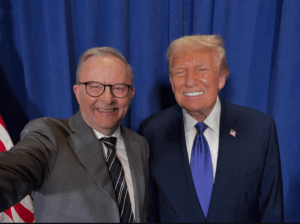“I’m not a dictator”: how Trump is consolidating executive power

Trump is behaving like “an emperor”, enabled by insufficient checks and balances on the power of the Oval Office.
On this episode of After America, Professor Elizabeth Saunders from Columbia University joins Dr Emma Shortis to discuss the extreme volatility of this administration’s foreign policy and how Trump is breaking down the guardrails of American democracy.
This episode was recorded on Thursday 28 August.
You can sign our petition calling on the Australian Government to launch a parliamentary inquiry into AUKUS.
Dead Centre: How political pragmatism is killing us by Richard Denniss is available now via the Australia Institute website.
Guest: Elizabeth N Saunders, Professor of Political Science, Columbia University // @profsaunders
Host: Emma Shortis, Director, International & Security Affairs, the Australia Institute // @emmashortis
Show notes:
‘Imperial President at Home, Emperor Abroad’ by Elizabeth Saunders, Foreign Affairs (June 2025)
Photo: The White House/Flickr (U.S. Government work)
Theme music: Blue Dot Sessions
We’d love to hear your feedback on this series, so send in your questions, comments or suggestions for future episodes to podcasts@australiainstitute.org.au.
Between the Lines Newsletter
The biggest stories and the best analysis from the team at the Australia Institute, delivered to your inbox every fortnight.
You might also like
Donald Trump cannot make the Epstein files go away. Will this be the story that brings him down?
Conspiracy theories are funny things. The most enduring ones usually take hold for two reasons: first, because there’s some grain of truth to them, and second, because they speak to foundational historical divisions. The theories morph and change, distorting the grain of truth at their centre beyond reality. In the process, they reinforce and deepen
Can Albanese claim ‘success’ with Trump? Beyond the banter, the vague commitments should be viewed with scepticism
By all the usual diplomatic measures, Australian Prime Minister Anthony Albanese’s meeting with US President Donald Trump was a great success. “Success” in a meeting with Trump is to avoid the ritual humiliation the president sometimes likes to inflict on his interlocutors. In that sense, Albanese and his team pulled off an impressive diplomatic feat. While there was one awkward
It shouldn’t be this difficult to condemn plans to commit a crime against humanity
Australians, by and large, have seen America as an ally critical to our national security. But in just a few short weeks, Donald Trump has shown his administration is a threat to Australia and the world’s security. Australia may not be able to stop Trump from creating chaos, but we will undermine our own security if we don’t stand up for ourselves and for our values.





